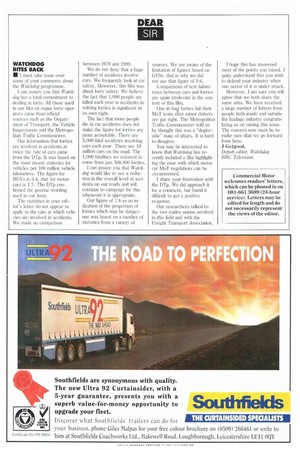WATCHDOG BITES BACK • I must take issue over some of your comments about the Watchdog programme.
Page 47

If you've noticed an error in this article please click here to report it so we can fix it.
I can assure you that Watchdog has a total commitment to dealing in facts. All those used in our film on rogue lorry operators came from official sources such as the Department of Transport, the Vehicle Inspectorate and the Metropolitan Traffic Commissioner.
Our information that lorries are involved in accidents at twice the rate of cars came from the DTp. It was based on the most recent statistics for vehicles per 100 million vehicle kilometres. The figure for HGVs is 3.4, that for motor cars is 1.7. The DTp confirmed the precise wording used in our item.
The statistics in your editor's letter do not appear to apply to the rate at which vehicles are involved in accidents. We made no comparison between 1979 and 1989.
We do not deny that a huge number of accidents involve cars. We frequently look at car safety. However, this film was about lorry safety. We believe the fact that 1,000 people are killed each year in accidents involving lorries is significant in its own right.
The fact that more people die in car accidents does not make the figure for lorries any more acceptable. There are 5,000 fatal accidents involving cars each year. There are 19 million cars on the road. The 1,000 fatalities we referred to come from just 500,000 lorries.
1 can assure you that Watchdog would like to see a reduction in the overall level of accidents on our roads and will continue to campaign for this whenever it is appropriate.
Our figure of 1:8 as an indication of the proportion of lorries which may be dangerous was based on a number of statistics from a variety of sources. We are aware of the limitation of figures based on GV9s: that is why we did not use that figure of 1:6.
Comparisons of test failure rates between cars and lorries are again irrelevant in the context of this film.
One in foul lorries fail their mo'r tests alter minor defects are put right. The Metropolitan Traffic Commissioner told us he thought this was a "deplorable" state of affairs. It is hard to disagree.
You may be interested to know that Watchdog has recently included a film highlighting the ease with which motor car MUT regulations can be circumvented.
I share your frustration with the DTp. We did approach it for a comment, hut found it difficult to get a positive response.
Our researchers talked to the two trades unions involved in this field and with the Freight Transport Association.
I hope this has answered most of the points you raised. I quite understand that you wish to defend your industry when one sector of it is under attack.
However, I am sure you will agree that we both share the same aims. We have received a large number of letters from people both inside and outside the haulage industry congratulating us on raising this issue. The concern now must be to make sure that we go forward from here.
J Getgood, Deputy editor, Wakhdog.
BBC Television,












































































































